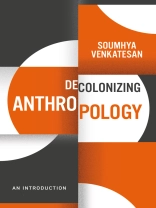Decolonization has been a buzzword in anthropology for decades, but remains difficult to grasp and to achieve. This groundbreaking volume offers not only a critical examination of approaches to decolonization, but also fresh ways of thinking about the relationship between anthropology and colonialism, and how we might move beyond colonialism’s troubling legacy.
Soumhya Venkatesan describes the work already underway, and the work still needed, to extend the horizons of the discipline. Drawing on scholarship from anthropology and cognate disciplines, as well as ethnographic and other case studies, she argues both that the practice of anthropology needs to be and do better, and that it is worth saving. She focuses not only on ways of decolonizing anthropology but also on the potential of ‘a decolonizing anthropology’.
Rich with insights from a range of fields, Decolonizing Anthropology is an essential resource for students and scholars.
Table des matières
Acknowledgements
Note on racialized terms
1 Introduction: Decolonizing Anthropology and a Decolonizing Anthropology
2 What is Decolonization?
3 Colonialism-Anthropology
4 Epistemological and Epistemic Justice
5 Ignorance and Ignoring
6 Understanding and Transforming Universities: The Potential of Ethnography and Anthropology
7 On Courses and in Classes
8 Conclusion
Notes
Bibliography
Index
A propos de l’auteur
Soumhya Venkatesan is Professor of Social Anthropology at the University of Manchester.












